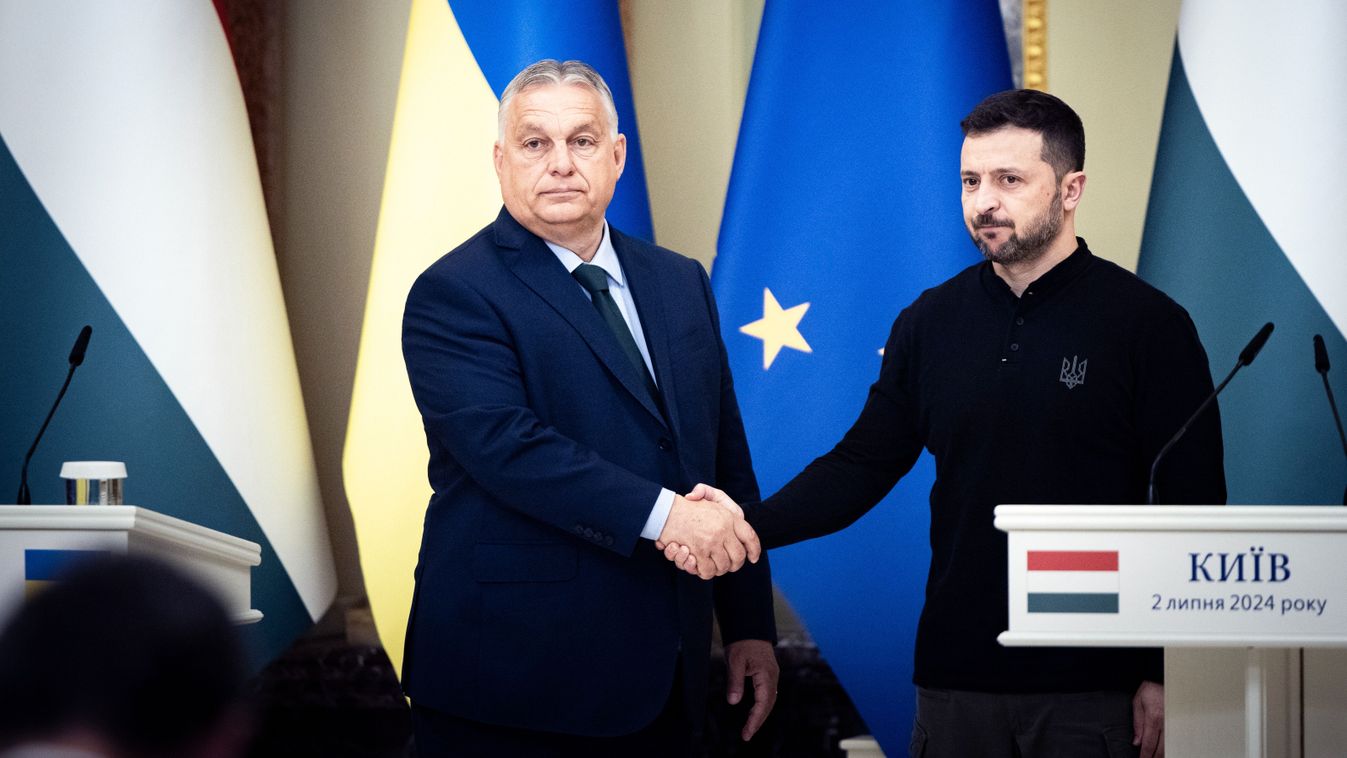
Hungarian Prime Minister Viktor Orban and Ukrainian Peresident Volodymyr Zelensky (Photo: MTI/Hungarian PM's Press Office/Zoltan Fischer
Hungarian Prime Minister Viktor Orban christened his peace initiative “Peace Mission 3.0,” a diplomatic endeavor designed to broker an immediate cease-fire between Ukraine and Russia intended to create an environment conducive to peace negotiations. However, with the release of NATO’s Washington Summit Declaration, Peace Mission 3.0 was swiftly eclipsed by NATO’s resolute strategic stance on the Ukraine conflict.
Orban’s proactive move with Peace Mission 3.0 aimed to rally support from fellow NATO member states for his peace proposal. However, the declaration issued on July 10 in Washington delineated NATO’s primary objectives concerning the Ukraine war: bolstering Ukraine in constructing a military force capable of defeating Russia, unequivocally attributing full responsibility for the conflict to Russia and establishing strategic NATO guidelines for containing and countering Russian actions.
German Chancellor Olaf Scholz remarked before the summit that ensuring Ukraine’s triumph over Russia was a unanimous goal among certain NATO allies. This sentiment underscored the futility of Orban’s peace plan gaining acceptance either at the summit or in influencing NATO’s war strategy against Russia.
Although the NATO Washington Summit channeled its security anxieties toward external threats, this was not the sole factor at play. NATO’s security concerns also partly originate from the domestic political turbulence within its member states triggered by forthcoming elections. For example, debates within the Democratic Party in the United States about urging President Joe Biden to step aside have injected uncertainty into the November presidential election. Similarly, the results of the French parliamentary elections have heightened the risk of governmental paralysis. These pivotal NATO member states have sought to divert domestic political pressure by emphasizing external crises.
Limited influence within EU
Before his visit to China, Orban made his inaugural trip to war-torn Ukraine. This was followed by a visit to Russia. Subsequently, the leaders of Ukraine and Russia both indicated that they were not considering a temporary cease-fire but rather a comprehensive peace agreement. Chinese leaders communicated to Orban that a cease-fire could only materialize if all major powers exerted positive rather than negative energy. Orban’s visit to China was prompted by Russian President Vladimir Putin’s readiness to discuss the consensus on political settlement of the war that was proposed by China and Brazil.
Orban’s peace proposal attracted international attention as Hungary assumed the rotating presidency of the European Union in early July — a six-month term. However, under the Lisbon Treaty, the EU’s rotating presidency does not manage the organization’s foreign and security affairs, and European Commission President Ursula von der Leyen criticized Orban’s visit to Moscow, asserting that “appeasement will not stop Putin.”
Orban, who is viewed by many European leaders as an outlier, is unlikely to gain unanimous support for his peace proposal within the EU. However, this does not mean that Orban’s stance will not impact EU politics. Already, far-right parties from seven EU countries have announced their participation in the Patriots for Europe alliance initiated by Orban, potentially forming a new faction in the European Parliament and giving Orban’s peace proposal some weight.
Unjust accusations against China
Orban cannot reverse NATO countries’ biases against China. For the first time, the NATO declaration has condemned China’s position on the Ukraine war, eliciting a vehement response from the Chinese Foreign Ministry, which denounced the statement as an unfounded “assignment of blame to China.” The move by NATO aims to legitimize its increasing involvement in Indo-Pacific regional affairs. To forge a consensus, some NATO officials accused China of supplying Russia with parts for weapons and dual-use materials before the summit. Despite China’s repeated emphasis on not providing weapons to the combatants and strictly controlling the export of dual-use items, some NATO countries remained skeptical.
In truth, Chinese companies find it challenging to discern whether exported products are used by Russian military enterprises in normal Sino-Russian trade — as the longer the supply chain, the harder it is to identify end-users. Further, the production capacity data of Russian military enterprises during wartime is highly classified, making it impossible for Chinese companies to know if the end-user is a military entity.
Conversely, in their economic sanctions against Russia, NATO countries overlook their own enterprises’ war responsibility. The Caspian Pipeline Consortium (CPC) is a joint venture between energy companies from Russia, Kazakhstan, the United States, the United Kingdom, Italy and the Netherlands, with Chevron holding a 15 percent stake. This consortium’s primary business is transporting oil from Kazakhstan and Russia to Eastern European countries. In January, the CPC’s press office announced a record-breaking 63.5 million tons of oil transported in 2023, with shareholders receiving $1.34 billion in dividends.
NATO’s security anxiety, triggered by the stalemate in Ukraine, has led it to shift blame to third parties rather than engage in a little introspection. Without a fair, equal, and rational understanding of war responsibility, peace in Europe will remain elusive, and the security issues may spill over into Asia, affecting global stability.
